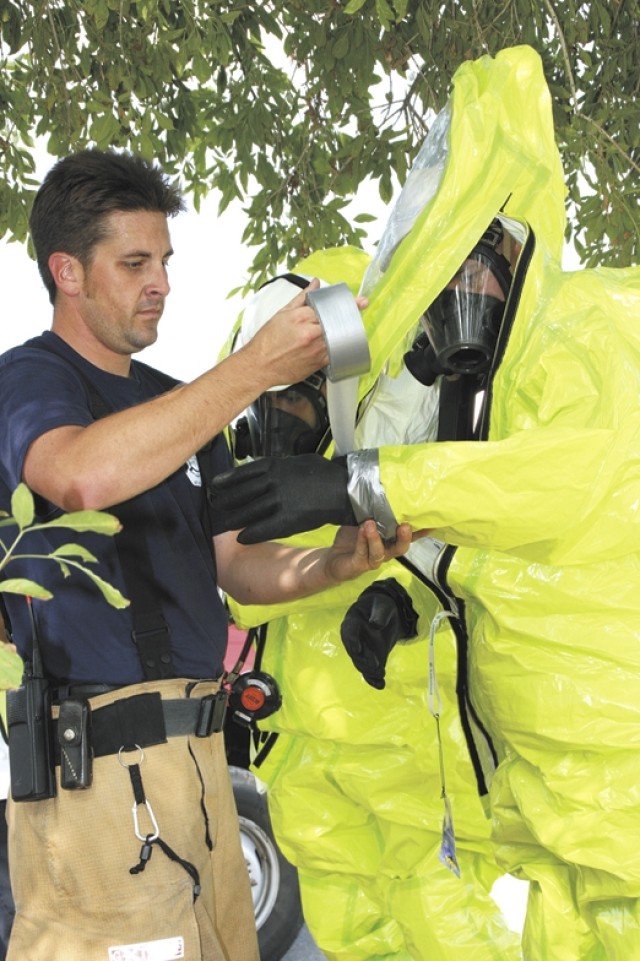FORT SAM HOUSTON, Texas - With September being National Preparedness Month, installation officials are encouraging Fort Sam Houston residents and employees to get a kit, to make a plan and to practice it.
"It really doesn't matter why something bad happened, you just have to be able to respond to it when it does," said Brad Barrett, emergency manager at the Directorate of Plans, Training, Mobilization and Security.
The most common natural disasters in this area are severe thunderstorms, high winds and flash flooding, Barrett said.
With heavy rains, the Salado Creek basin floods and this leads to frequent closures of the Binz-Engleman access control point.
"If it rains just a couple inches in an hour it (the gate) will close," Barrett said.
Barrett heeds motorists to obey the safety slogan, "Turn Around, Don't Drown," and not to drive through flowing water.
Although the flooding does not affect buildings, it still has an impact on the installation. For example, if an ambulance needed to get to Brooke Army Medical Center from Fort Sam Houston it would have to go out on IH-35, he said.
Another threat to the installation is hazardous materials spills, Barrett said. The post is embedded in the middle of San Antonio and surrounded by interstates and rail lines that carry hazardous materials.
"There is a rail line that runs right through the middle of the installation by BAMC," he said.
Fort Sam Houston units regularly participate in HAZMAT exercises with civil authorities, he said. The next exercise is Sept. 15 to 19.
When the Fort Sam Houston community needs to be notified of a threat the Installation Operations Center uses a variety of overlapping communications systems.
A mass e-mail notification goes out to commanders and directorates warning of the danger so they can let their Soldiers and employees know. This can be done in conjunction with an automated phone notification system, he said.
The Giant Voice is a mass notification system that uses eight speaker towers throughout the post to reach people outdoors.
"It does audible voice messages that can be very tailored," Barrett said.
The Giant Voice does not use a siren system because that would require people to know what the different sirens mean, he said.
Another system that will be available in a couple months is the Computer Emergency Notification System, which sends out an emergency notice to every computer on the installation, Barrett said.
The CENS message appears on the computer screen regardless of what program the user is in, Barrett said. It also sounds an audible warning. The computer user must manually close the message.
The advantage of CENS is that it does not sit in someone's e-mail waiting to be opened, he said.
Of course, people are encouraged to tune to local TV and radio stations and Internet sites, such as the National Weather Service, Barrett said.
National Preparedness Month is an opportunity for Families to focus on any type of event that could happen here, said Maj. Dave Harrington, an emergency medical planner at Headquarters, U.S. Army Medical Command.
Harrington warns people not to get caught up in the three misconceptions of disasters:
It will not happen here, it will not happen to me, and someone else will be there to take care of the problem.
"We tend to assume that the cavalry is going to come riding in and save the day," Harrington said, "and in some situations that may not be doable."
Harrington recommends having a minimum two-week supply of non-perishable food items and water along with emergency supplies, such as flashlights and batteries. With impending disasters, such as hurricanes, stores quickly run out of items and it may be awhile before they are restocked.
Dr. Keith Steinhurst, an emergency planner at the MEDCOM, said that it is not only important to have a Family emergency plan, but to exercise it.
"If you don't actually try to work it before the day of (the disaster), you could get surprised and it may not be a good surprise," Steinhurst said.


Social Sharing